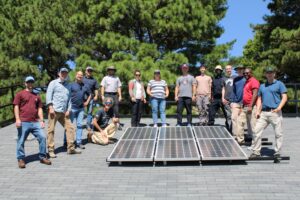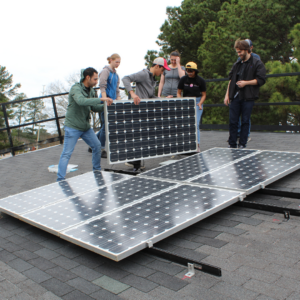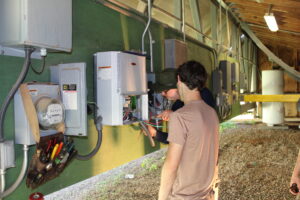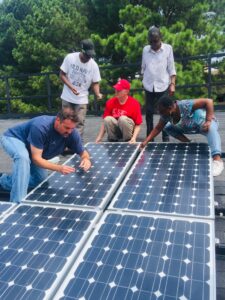Individuals from various professional backgrounds take away valuable skills from NCCETC’s training courses
The training program at the North Carolina Clean Energy Technology Center (NCCETC) strives to support the clean energy workforce in North Carolina by providing an array of courses aimed to enhance the skill sets of individuals looking to break into the renewable energy industry.
From the foundations of solar installation in Fundamentals of Solar PV Design and Installation to big-picture topics like Renewable Energy Project Development, the courses bring in participants from various backgrounds and career paths who are seeking an opportunity to learn from experts in the field.

Emily Rendon Bonifacio, a Sustainable Materials and Technology major with a minor in Renewable Energy Assessment and Environmental Science at North Carolina State University’s (NCSU) College of Natural Resources (CNR), heard about the opportunity to attend the July 2024 Fundamentals of Solar PV Design and Installation (FSPV) course and chose to dive into the 40-hour, five-day training.
The FSPV course focuses on the technical aspects of solar photovoltaic (PV) design and installation, specifically the system types, components, applications, design and best practices for installation, maintenance, and troubleshooting. Bonifacio had been introduced to solar PV in one of her classes and sought to expand her knowledge in that area. She enjoyed the format of the course, consisting of four days in the classroom learning technical aspects, and a fifth day gaining hands-on experience installing a fully integrated grid-tied residential PV system.
Now, in a renewable energy policy and law class at NCSU, Bonifacio recognizes that she is able to approach in-class concepts with the insights she gained by completing FSPV. She says, “this training has given me greater confidence to pursue a career in renewable energy”, specifically in the solar industry. Not only did the course further her technical understanding of solar PV, she says she also was able to expand her professional network, meeting a broad range of people in the class that inspired her.

Ben Wesley, Assistant Chief Electrical Code Consultant at the NC Office of State Fire Marshal (OSFM) Electrical Division, sought out the training courses at NCCETC to gain expertise in PV systems after seeing firsthand how the solar industry is taking off. With over three decades of electrical experience in various roles as a journeyman, foreman, and project superintendent, Wesley is an expert in his field. After becoming an inspector for OSFM, he noticed there was a lack of knowledge about PV when it came to building codes and realized that PV is “the most rapidly changing sector of the electrical industry.”
Wesley started out with the FSPV course in March 2024, as it is crucial to understand the fundamentals of PV in order to inspect it in his role at OSFM. Following the week of instruction, he quickly returned in May 2024 to attend NCCETC’s Solar Storage workshop, stating it was a “hot topic in the state right now.” The Solar Storage workshop spans over three days covering 24 course hours. The course focuses on the principles of battery-based systems, specifying and sizing a battery bank, inverters, and charge controllers for battery-based systems, and understanding the code implications of the systems.
Wesley particularly enjoyed learning from instructor David Del Vecchio, saying “the way he teaches, everybody would come along at the same pace; he kept it interesting and relevant. When he did reference code, he was one hundred percent accurate in every code, in his interpretation and his use of it.” He also noted that the class wasn’t only made up of inspectors and contractors, but also of college students who will see the technology continue to evolve throughout time. “It was good to sit in a class full of people from all different backgrounds, all involved in PV in some way, but coming from a different direction.”
Now that Wesley has completed both FSPV and the Solar Storage workshop, he is able to travel to jurisdictions throughout the state to counsel and teach inspectors who may not be as comfortable with PV systems. He says, “Now I understand the principles, if someone asks the reason why, I can now tell them not just the code, but the theory.” He holds onto the books he acquired for the courses and looks at them from time to time to brush up on his PV knowledge. He says that although he has an important role in code inspection, he is accessible to everyone and can now share his newfound knowledge with those who reach out to him.

Jason Davis, Project Superintendent at Colite Technologies, participated in several courses at NCCETC to gain experience and to better position his company to address new technologies. David has 30 years of experience in the electrical industry, starting out as a United States Navy Construction Electrician before moving on to General Electric. Colite Technologies reached out to him seeking an electrical qualifier and project superintendent for their work which consists of commercial solar installations, renewable lighting systems, and long-term maintenance plans for solar systems. Although Davis had no experience with the solar industry, he said, “electricity is electricity” and jumped into the renewable sector with Colite Technologies, who have since been listed on Solar Power World’s 2024 Top North Carolina Solar Contractors List.
In 2024, Davis participated in the Advanced Solar PV Design and Installation (ASPV), Operations and Maintenance of PV Systems (O&M) courses, along with the Solar Storage workshop. ASPV builds off of the fundamentals of solar PV design and installation and covers advanced topics relating to the National Electric Code (NEC) requirements for PV systems. O&M is a two-day course that focuses on evaluating the performance of systems, including specific data collection and evaluation, and includes hands-on activities that allow participants to practice the technical skills learned. He found that having a better understanding of the design process can help when it comes to adjusting a system to a customer’s needs in his everyday work.

Davis says he is “an advocate of self-development and improvement”, adding “we should all invest in ourselves first; if you’re not learning, you’re not growing.” He also participated in IronRidge’s Installer Certification Program, which partners with NCCETC to conduct skills assessments at the NCCETC solar training yard on NCSU’s campus. Since completing the courses at NCCETC, he says it gave his company a competitive edge. They are able to come up with new design concepts while in the field and utilize troubleshooting techniques that make their processes more efficient.
Lance Pittman, Director of Engineering at BW Solar, has a background in engineering, procurement, and construction, and recently entered into the development sector, working with utilities, getting permits, and collaborating with various counties. BW Solar focuses on the development of large-scale solar and energy storage projects. Pittman decided to take the Advanced Solar PV Design & Installation (ASPV) and Renewable Energy Project Development (REPD) courses at NCCETC because he wanted to learn about the latest technology in the industry as it moves very quickly. REPD is a 40-hour, nine-week online course that provides a sound foundation for existing renewable energy technology applications, solar fundamentals, and business aspects of project development.
Pittman says that because BW Solar is a smaller company, he would benefit from gaining more in-depth knowledge. After completing the two courses, he found that learning about equipment compatibility, local codes and jurisdictions, and gaining hands-on experience for how a system works together aided in his development goals. He noted that at a county meeting in Virginia, the topic of the noise a solar inverter makes was brought up, and he was able to speak about it firsthand to describe that the level of noise from string inverters is actually very low, which eased fears throughout the room. Pittman hadn’t heard the level of noise a residential solar inverter makes before visiting the NCCETC’s solar training yard, and was glad to have been able to bring this expertise to his career down the line.
The training courses at NCCETC continue to be an influential source of knowledge for individuals from various professional backgrounds. Each course offers unique insights about the many aspects of the renewable energy field and contributes to a greater understanding of those in the workforce who are looking to prepare for or advance their career within the industry. A well-informed, highly skilled workforce is essential to driving a clean energy economy, and NCCETC will continue to play its part in supporting professional development across the state through education and outreach.